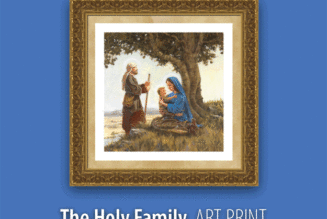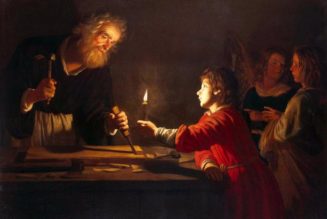 |
As Time cries, “Advance!”, we look back on a year that might fill the mouth of Time with lamentation. The Syrian civil war, the Christchurch mosque massacre, economic collapse in Venezuela, Hong Kong protests, the El Paso Walmart shooting, the Sri Lanka Easter terror attack, the Notre-Dame fire, and political upheaval in America. What is the common man to conclude when considering the depravations and deprivations of his fellows as church bells chime on New Year’s Eve?
There is no better tale to ring an old year out and a new year in than Charles Dickens’s The Chimes. This little story by the great storyteller deals with the temptation to look back on the tragedies of a year gone by with dejection, even believing that man is “born bad.” While Catholics do not believe that man is born bad, it is difficult not to believe that he has become bad. The year 2019 had its share of corroborating crises, and The Chimes offers timely advice for 2020 as we advance.
Wrong every way. Wrong every way! Born bad. No business here! I have no business with the New Year nor with the old one neither. Let me die!
These are the thoughts that plague Toby Veck, a simple porter whose mind is a discerning one—and he discerns very little to be hopeful for in mankind as he trots up and down the snowy streets bearing mankind’s bundles and hearing mankind’s news. Toby is harried by misanthropic philanthropists and well-mannered villains (rendered as only Dickens can) who condescendingly preach and perpetuate the ingratitude and ineptitude of the luckless. They fill Toby with grave misgivings that much of the human race is a bad lot and bad at heart, condemned to live out bad lives.
At the same time, he hears a clamorous optimism that tumbles from the steeple under which he awaits employment. The chimes of the great church bells ring in Toby’s ears and invite him to be merry. And they do make him merry, unless he mars their merriment and his own by injecting the negativities and dishonesties of his times into their voices. And so he wavers between delight and despair, between the news of his daughter’s wedding and the news of a poverty-ravaged woman who kills her infant before killing herself. “Unnatural and cruel,” Toby cries as his scales tip against the greater part of humanity as having no business on the earth, being born bad.
And then, suddenly, Toby Veck finds that he has died… and that he is high up among the bells that he has listened to all his life… and the bells are issuing forth not just chimes, but Goblins—Goblins that swarm and scatter through the world, lulling people to sleep, flogging others with whips, loading others with chains; Goblins that soar wildly through the habitations and businesses of man; and Goblins that impose their impish devices mercifully and mercilessly as the Chimes ring. Upon the final stroke, the spectral creatures vanish, leaving Toby Veck in the dark steeple with the Goblin of the Great Bell, who reprimands Toby for his loss of faith in the human condition. The three admonitions which boomed in that belfry are ones that all should hear and take to heart, especially at the turning of the year.
One!
The voice of Time cries, “Advance!” He does a wrong who turns back or tries to impede the course of Time by mourning over times which have had their trial and failure—“a cry that only serves the present time, by showing men how much it needs their help when any ears can listen to regrets for such a past.” Hearken not to golden ages lost and gone forever. Advance! And advance with an open heart and an open hand. Man must only remember that “for his greater worth, his greater happiness, his better life… millions uncountable have suffered, lived, and died to point the way before him.” Advance!
Two!
The voice of Man cries, and he is heard. He does a wrong who holds that the powers on high are deaf, or that there is aught in their response “bespeaking disregard, or stern regard, of any hope, or joy, or pain, or sorrow, of the many-sorrowed throng.” The powers on high do not measure human passions and affectations by earthly scales, but measure them they do—and not lightly either. The powers on high do not speak in the tongue of “the dull vermin of the earth; the Putters Down of crushed and broken natures, formed to be raised up higher than such maggots of the time can crawl or can conceive.” But a voice they have. Hear them. Advance, and Hope!
Three!
The voices of Men cry, and must be heard by Men as arising from Men. He does a wrong who turns away from “the fallen and disfigured of his kind; abandons them as vile; and does not trace and track with pitying eyes the unfenced precipice by which they fell from good.” Those who have fallen are condemned already—condemn them no further. Rather reach to them and raise them to the limit of your strength. Advance, and Hope, and Love!
Thus tolled the Goblin of the Great Bell, shaking Toby Veck with the truth that man, despite our Fallenness, is capable of great good, before sending him on a ghostly journey, that he may see as well as hear. The Chimes is a reminder that, though the world is besieged and battered by misfortune, ugliness, and tragedy, it remains the duty of every man and woman to advance with spirits unconquered. In telling this story, Dickens hauls on the bell ropes of the heart, ringing in the New Year and crying, “Cheer up! Don’t give way. A new heart for a New Year, always!”
Image: 1845 illustrations by Daniel Maclise for The Chimes









